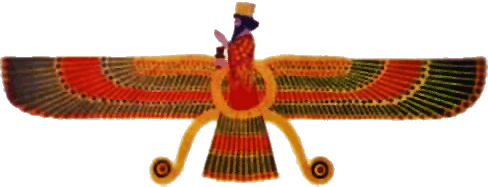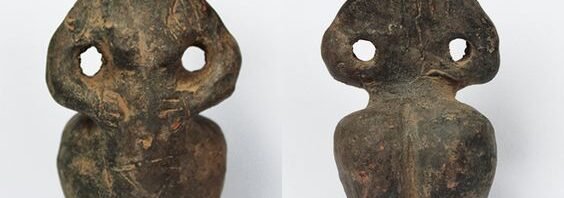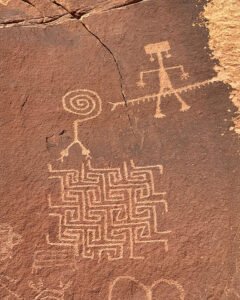
Seeking Heroes and the Heroic Self
We are taught to look for heroes, for saviours, for external help. That is a big part of the problem. We end up projecting our need for change into a need for others to change, before we can change.

Zoroastrianism: Ahura Mazda
Ahura Mazda (also spelled Ahuramazda), meaning “Wise Lord,” is the supreme god in Zoroastrianism, one of the world’s oldest monotheistic religions, founded by the prophet Zarathustra (or Zoroaster) in ancient Persia (modern-day Iran).

The Maze Rock Petroglyph and how it Visualises the Creation of the Universe.
This post introduces an entirely new philosophical viewpoint – the Dissociative Theory of Creation. As well as other notions which compare the human mind to that of the divine. This is the highest level of philosophical thinking, it is emergent. I hope you enjoy these new ways of visualising the divine creative process, and also, the irony built into it

The Death of Socrates: History Showing that we are not Learning
The background to Socrates’ death sentence in 399 BC is both fascinating and complex, reflecting the political and social climate of ancient Athens.

The lost tomb of Thutmose II
The finding of the lost tomb of Thutmose II is a significant event in the field of archaeology. Here are some key points about this remarkable find and relation to wider Egyptian culture of the period.

The Jōmon culture of Japan and the Mother Goddess
The Jōmon culture of Japan and the Mother Goddess The Jōmon culture is one of the oldest and most significant prehistoric cultures in Japan, known for its distinctive pottery, early agricultural practices, and complex social structures. The term “Jōmon” refers to the cord-marked pottery that the culture produced, which became a hallmark of their society. …

The Spider Queen
The concept of the Spider Queen, and the women who align with her archetype, reveals deeper insights into both mythological symbolism and the marginalization of feminine power in society.

Memory Loss, Ascension, and Dementia
In the context of ascension and memory loss, one could argue that those who experience memory loss or cognitive decline might be undergoing a deeper, spiritual process of shedding their earthly attachments, just as some spiritual traditions describe the process of personal ascension.

If a religion decides there will be no more prophets. Are they commanding their God not to speak?
When a religion or community decides that God will no longer speak to them, this decision can lead to a spiritual stagnation, as new insights and understandings are viewed as disruptive.

The confusion between The Second Coming and Armageddon
While the Second Coming of Christ is clearly a spiritual event about salvation, it has been misunderstood or misrepresented by several Christian groups throughout history. In many of these teachings, Armageddon becomes synonymous with Christ’s return, emphasizing divine judgment and the defeat of evil rather than focusing on the message of love, grace, and salvation that Jesus brought.

The mother goddess in Mesoamerica
The concept of a global Mother Goddess cult that believed it was a Goddess that is the source of creation as we know it, seems a strong one. As is the notion that it used very similar iconography and conceptualisations, which started quite vague and simplistic, but developed in complexity over time, and existed from the Palaeolithic to at least the end of the Bronze Age. This came to be replaced, often by force, by a patriarchal focussed cult which has resulted in most of the worlds religions we see today.

The Waxing and Waning of the Divine Feminine Through Time
In this article, I want to highlight some of those feminine heroes, and the sacrifices they made, and how they became the feminine heroines of their time.

The Vinca Culture
The Vinca culture, (also known as the Vinča culture or Tordos-Vinca culture) was a Neolithic culture that flourished in the Balkans between approximately 5700 BCE and 4500 BCE. In this article, we will focus on the Vinca female figurines and ask if they were portable Mother Goddess idols used by semi nomadic priests and the ruling classes?

Sovereignty and the Authority Problem
You are a sovereign being. Sovereign essentially means “self-possessed”, or in other words, you own yourself. Nobody else is capable of directing or governing your body or your mind except yourself.

Marcion of Sinope
Marcion of Sinope was an influential early Christian theologian who lived around 85-160 AD. He is best known for founding Marcionism, a belief system that distinguished between the vengeful God of the Old Testament and the loving God of the New Testament, whom he believed sent Jesus Christ.

The God Marduk
Marduk was a prominent god in ancient Mesopotamian religion, particularly revered in the city of Babylon. Initially, a god of thunderstorms, he rose to become the chief deity of Babylon and was later known simply as Bel, meaning “Lord”.

The Deified King Lugalbanda
Lugalbanda was a legendary Sumerian king of Uruk, often considered a hero in Mesopotamian mythology. He is known for his adventures and heroic deeds, and is also notable for being the father of the famous hero Gilgamesh, as mentioned in the Epic of Gilgamesh. His consort was Ninsun, a goddess, and he was later deified and worshipped in various Mesopotamian cities.

The Goddess Ninsun
Ninsun, also known as Ninsumun, was a Mesopotamian goddess revered for her wisdom, beauty, and maternal care. She is best known as the mother of Gilgamesh, the hero of the Epic of Gilgamesh, and the wife of the deified king Lugalbanda. Ninsun’s name, which means “Lady of the Wild Cows,” reflects her association with bovine qualities, symbolizing nurturing and fertility.

The Goddess Ninlil
Ninlil was a prominent goddess in Mesopotamian mythology, particularly associated with the air and wind. She was the wife of Enlil, the god of earth, wind, and storms, and shared many of his responsibilities, including declaring destinies

The God Utu
Utu, also known as Shamash in Akkadian, is the ancient Mesopotamian sun god. He was revered as the god of justice, truth, and protection for travellers. Utu was believed to see everything that happened during the day, making him a divine judge.





